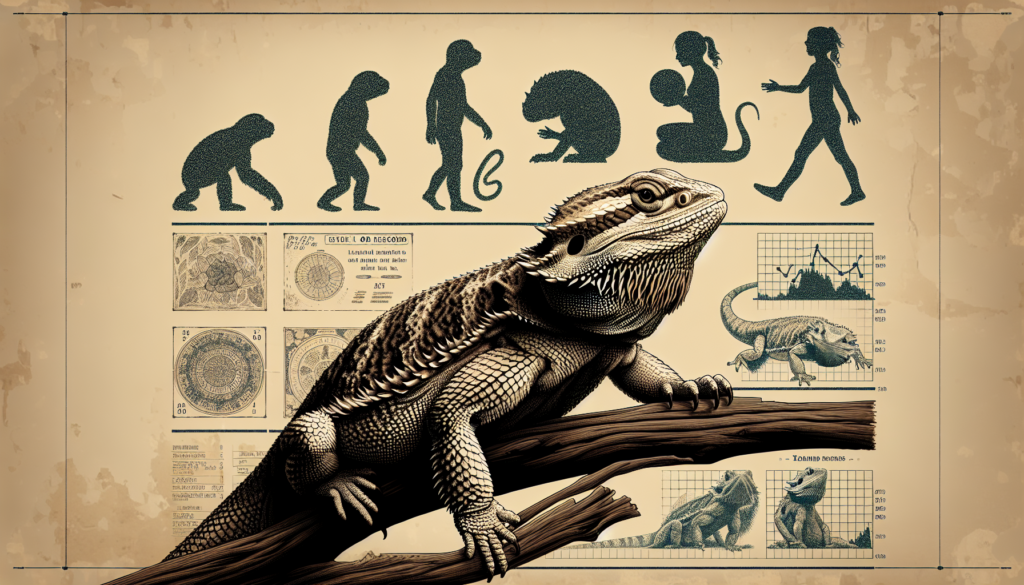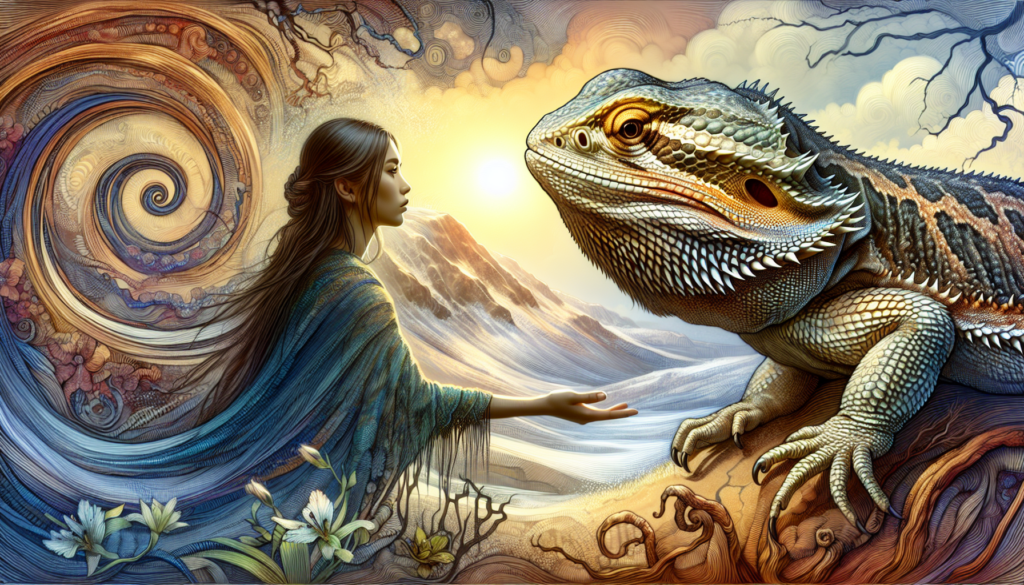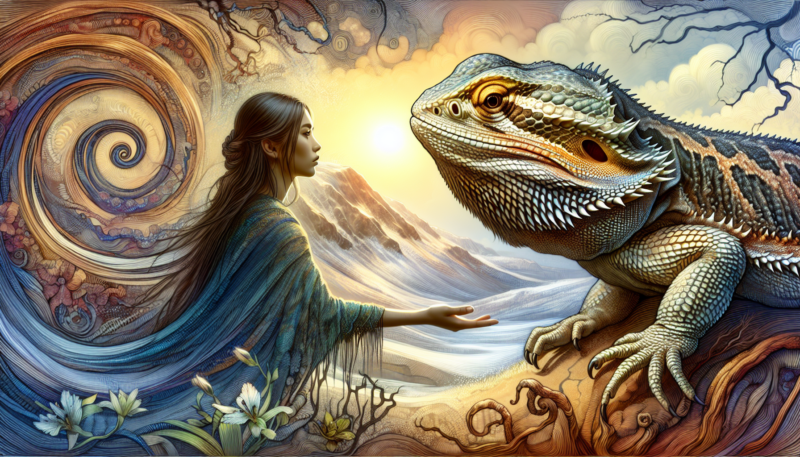Do you ever wonder how long a bearded dragon can live? If so, you’ll be delighted to learn about the oldest bearded dragon on record. This fascinating creature, known for its unique appearance and gentle nature, has captivated pet owners around the world. In this article, we explore the incredible story of the oldest bearded dragon, shedding light on its longevity and the factors that contribute to its impressive lifespan. Whether you’re a devout reptile enthusiast or simply curious about extraordinary creatures, join us as we uncover the secrets behind the oldest bearded dragon on record.

Introduction
Welcome to this comprehensive article on bearded dragons and their lifespan! If you’re a proud owner of a bearded dragon or considering getting one as a pet, it’s important to understand their unique characteristics, behaviors, and how to ensure they live a long and healthy life. In this article, we will delve into the fascinating world of bearded dragons, explore the oldest recorded bearded dragons, discuss the factors that affect their lifespan, and provide you with some valuable tips on how to increase their lifespan. So let’s get started!
What is a Bearded Dragon?
A bearded dragon, scientifically known as Pogona, is a species of lizard native to Australia. They are popular pets due to their docile nature, unique appearance, and ease of care. Bearded dragons have a distinctive look with their spiky throat pouches, which they puff out when threatened or during territorial displays. They also have wide, triangular heads, scaly bodies, and spacious enclosure.
Physical Characteristics
Bearded dragons typically grow to a length of about 18 to 24 inches, with males being slightly larger than females. Their bodies are covered in rough scales, which serve as a form of protection. These scales come in various colors and patterns, including shades of brown, tan, yellow, and orange. Additionally, you may find bearded dragons with patterns such as stripes or speckles.
Habitat and Behavior
In the wild, bearded dragons inhabit arid regions such as deserts, grasslands, and woodlands of Australia. They are well-adapted to this environment and can be found basking on rocks or branches to absorb heat from the sun. Bearded dragons are diurnal, meaning they are active during the day and sleep at night.
Bearded dragons are generally known for their calm temperament, making them ideal pets for individuals of all ages. They are curious creatures and enjoy exploring their surroundings. However, they can become stressed or aggressive if they experience inadequate care or feel threatened. Providing them with a suitable environment and proper handling is crucial to their overall well-being.
Diet and Lifespan
Bearded dragons are omnivorous, meaning they consume both plant matter and small insects. Their diet primarily consists of leafy greens, vegetables, fruits, and various insects like crickets and mealworms. A well-balanced diet is essential to ensure their overall health and longevity.
On average, bearded dragons have a lifespan of 8 to 12 years in captivity. However, with proper care and attention, some bearded dragons have been known to live even longer. Let’s explore the oldest recorded bearded dragons to see just how extraordinary their longevity can be.
The Oldest Bearded Dragon on Record
Bearded dragons, like many other animals, can live for a remarkable number of years if provided with the right environment and care. While specific records of age for wild bearded dragons are difficult to obtain, some remarkable cases have been documented through historical records, the Guinness World Records, and unverified claims.
Historical Records
Historical records dating back several decades provide accounts of bearded dragons living well into their teenage years. One notable case is of a bearded dragon named “Spike,” who lived for 18 years and brought joy to its owner for over two decades. These cases highlight the potential longevity of these amazing creatures and demonstrate the importance of providing them with proper care and nutrition.
Guinness World Records
The Guinness World Records also acknowledge some impressive bearded dragon lifespans. As of the time of writing this article, the oldest bearded dragon on record is named “Sebastian.” Sebastian attained the age of 24 years and 72 days in 2020, earning him the title for the longest-lived bearded dragon ever recorded. This incredible feat is a testament to the exceptional care and attention that Sebastian received throughout his life.
Unverified Claims
In addition to the official records, there are several unverified claims of bearded dragons that have lived beyond the 20-year mark. While these claims lack concrete evidence, they demonstrate the potential for bearded dragons to live well into their golden years. It’s important to take these claims with a grain of salt and focus on providing the best care possible for your own bearded dragon.
Factors Affecting Bearded Dragon Lifespan
Several factors can significantly impact the lifespan of a bearded dragon. Understanding these factors will help you create the ideal environment and care routine for your pet.
Genetics
Genetics play a crucial role in determining the potential lifespan of a bearded dragon. Some individuals may inherit certain genetic traits that make them more susceptible to health issues or affect their overall vitality. While you have little control over the genetics of your pet, providing proper care and attention can help mitigate any genetic predispositions and ensure a longer and healthier life.
Environment and Husbandry
The environment in which a bearded dragon lives has a direct impact on its lifespan. Creating a suitable habitat is vital to their well-being. Bearded dragons require spacious enclosures, preferably terrariums or vivariums, with adequate heating, lighting, and ventilation. The enclosure should provide both ample space for them to move around and various hiding spots to mimic their natural habitat. Maintaining appropriate temperature gradients and humidity levels is also essential.
Proper husbandry practices include regular cleaning of the enclosure, providing safe and stimulating enrichment, and avoiding any potential hazards. Additionally, avoiding abrupt changes in their environment and minimizing stressors can significantly contribute to their overall health and longevity.
Health and Veterinary Care
Regular veterinary care is crucial in maintaining the health and longevity of a bearded dragon. Routine check-ups with an experienced reptile veterinarian can help detect any underlying health issues before they become major problems. Vaccinations, parasite screenings, and dental care are part of a comprehensive healthcare routine.
Bearded dragons are prone to various health conditions, including metabolic bone disease, respiratory infections, and digestive disorders. Providing a balanced diet, UVB lighting for proper calcium absorption, and maintaining appropriate hygiene are important preventive measures. It’s essential to promptly address any signs of illness or distress and seek professional veterinary care when needed.

Tips for Increasing Bearded Dragon Lifespan
Now that we understand the factors that affect the lifespan of bearded dragons, let’s explore some essential tips to help you increase their longevity and overall well-being.
Proper Housing and Enclosure
As mentioned earlier, providing a spacious and well-maintained enclosure is crucial for bearded dragons. Ensure the enclosure is large enough for them to move around comfortably, with appropriate hiding spots and secure lids to prevent escapes. Consider temperature gradients, provide a basking area, and ensure access to clean water at all times. Regularly clean the enclosure to maintain hygiene and minimize the risk of infections.
Appropriate Diet and Nutrition
A well-balanced diet is vital for bearded dragons’ health and longevity. Offer a variety of leafy greens such as collard greens, mustard greens, and dandelion greens as the main component of their diet. Supplement these with vegetables like squash, bell peppers, and carrots, along with occasional fruit treats. Additionally, provide a consistent supply of appropriately-sized insects as a source of protein.
Supplements such as calcium and vitamin D3 should be added to their diet to prevent deficiencies. Avoid feeding bearded dragons foods that are toxic to them, such as avocado or rhubarb. Consult with a reptile veterinarian or a reputable source for specific dietary recommendations.
Regular Veterinary Check-ups
Establishing a relationship with a qualified reptile veterinarian and scheduling regular check-ups is essential to monitor your bearded dragon’s health. Veterinarians experienced in reptile care can provide guidance on husbandry, detect potential health issues early on, and provide appropriate treatments. Regular check-ups also ensure your bearded dragon receives any necessary vaccinations and screenings to maintain optimal health.
Conclusion
Bearded dragons are remarkable creatures with unique physical characteristics and docile temperaments that make them wonderful pets. While their average lifespan ranges from 8 to 12 years, some exceptional individuals have been known to live well beyond that. By considering the factors that affect their lifespan and implementing the tips provided, you can ensure that your bearded dragon lives a long, healthy, and fulfilling life. Remember, providing a suitable habitat, a balanced diet, regular veterinary care, and lots of love and attention will go a long way in increasing the lifespan of your beloved bearded dragon.
